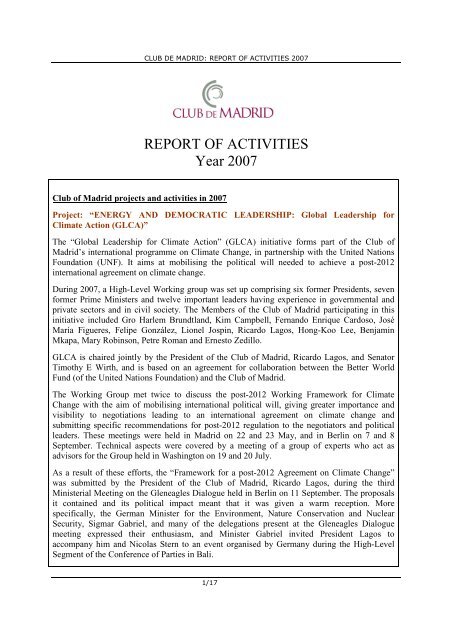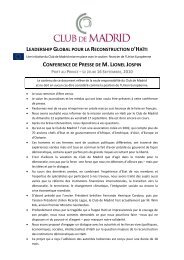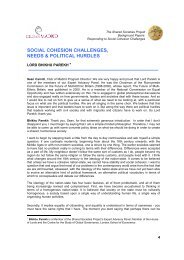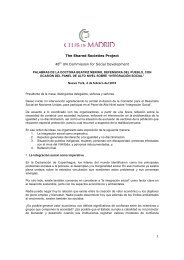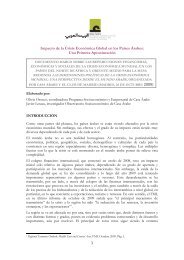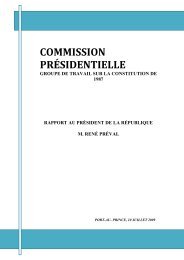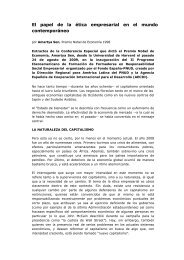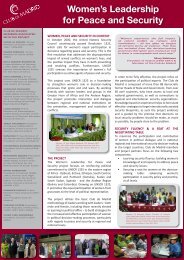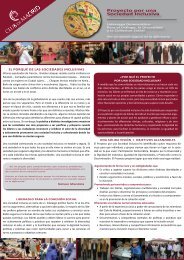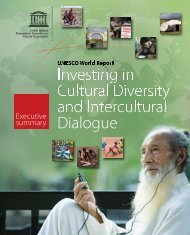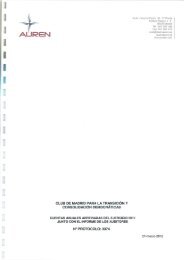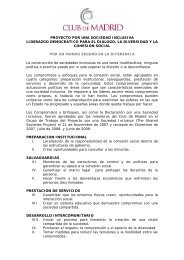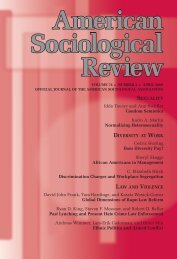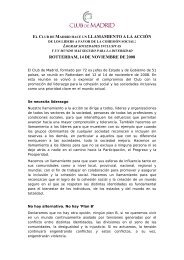Report of Activities 2007 - Club of Madrid
Report of Activities 2007 - Club of Madrid
Report of Activities 2007 - Club of Madrid
Create successful ePaper yourself
Turn your PDF publications into a flip-book with our unique Google optimized e-Paper software.
CLUB DE MADRID: REPORT OF ACTIVITIES <strong>2007</strong>met with various groups <strong>of</strong> State delegates and civil society representatives, including the PrimeMinister, former members <strong>of</strong> parliament, representatives <strong>of</strong> human rights associations, themedia, trade unions, lawyers, activists and politicians. Meetings focused on freedom <strong>of</strong>association and the electoral system, the media, future parliamentary elections and freedom <strong>of</strong>association in the legislative framework. The subjects covered during this mission included theelectoral law and laws regarding political parties, public meetings and Non-GovernmentalOrganisations.Missions to BahrainSubsequent to the missions carried out by the <strong>Club</strong> <strong>of</strong> <strong>Madrid</strong> to Morocco in March and Jordanin April, the organisation sent a mission to the Kingdom <strong>of</strong> Bahrain in April focusing onfreedom <strong>of</strong> association. It was led by the <strong>Club</strong> <strong>of</strong> <strong>Madrid</strong> Members Sadig Al Mahdi (Sudan),Zlatko Lagumdzija (Bosnia and Herzegovina) and Cassam Uteem (Republic <strong>of</strong> Mauritius).With the support <strong>of</strong> the Bahrain Centre for National Studies, the project associate, thedelegation met with members <strong>of</strong> the Bahrain government, parliament and civil society,including S.E. Sheikh Khalid Bin Ahmed Al Khalifa, Minister <strong>of</strong> Foreign Affairs, members <strong>of</strong>both chambers in the parliament, representatives <strong>of</strong> ten political parties, eleven civil societyorganisations, including pr<strong>of</strong>essional associations, human rights and women’s organisations andrepresentatives <strong>of</strong> several media.The <strong>Club</strong> <strong>of</strong> <strong>Madrid</strong>’s work in this project was carried out in collaboration with leadersinvolved in the processes <strong>of</strong> dialogue in Jordan, Bahrain and Morocco who, in a subsequentphase <strong>of</strong> the project, will share this experience with other countries in the region, such as Egypt,Saudi Arabia and Tunisia. This mission marked the start <strong>of</strong> a learning process on the progressachieved by the Bahrain people regarding democratic reform and the identification <strong>of</strong>challenges still remaining and how they can be met.At the end <strong>of</strong> October, the <strong>Club</strong> <strong>of</strong> <strong>Madrid</strong> carried out a second mission to the Kingdom <strong>of</strong>Bahrain, with the participation <strong>of</strong> the Members Sadig Al Mahdi (Sudan) and Valdis Birkavs(Latvia). The <strong>Club</strong> <strong>of</strong> <strong>Madrid</strong> took part in meetings with State and civil society representativeson the subject <strong>of</strong> freedom <strong>of</strong> association and participation in public affairs. Amongst thepartners with which the <strong>Club</strong> <strong>of</strong> <strong>Madrid</strong> worked in Bahrain were Mr Jamal Fakhro, First Vice-President, Shura Council; Dr Abdulaziz Abul, Member <strong>of</strong> Parliament; and Mr Adbulnay Alekry<strong>of</strong> the Bahrain Human Rights Society.Meeting on democratic values in the Arab World in Cordoba, SpainIn mid-May, the <strong>Club</strong> <strong>of</strong> <strong>Madrid</strong> organised a meeting in Cordoba, Spain, on democratic valuesand freedom <strong>of</strong> association in the Arab World, as part <strong>of</strong> the project receiving support from theEuropean Commission and the United Nations Fund for Democracy. The meeting leaders wereby the <strong>Club</strong> <strong>of</strong> <strong>Madrid</strong> Members Abdul-Kareem Al-Eryani (Yemen) and Sadig Al Mahdi(Sudan). The meeting, held with the support <strong>of</strong> Rosa Aguilar, Mayor <strong>of</strong> Cordoba, was openedby Miguel Ángel Moratinos, Spanish Minister <strong>of</strong> Foreign Affairs, and participants includedsenior <strong>of</strong>ficials from Bahrain, Jordan and Morocco.Members <strong>of</strong> the <strong>Club</strong> <strong>of</strong> <strong>Madrid</strong> and representatives <strong>of</strong> the government, parliament and civilsociety <strong>of</strong> these three countries centred their discussions on the subject <strong>of</strong> freedom <strong>of</strong>association as a key element in democratic practice. The meeting, which received the support <strong>of</strong>the Casa Árabe - International Institute <strong>of</strong> Arab and Moslem World Studies, aimed to fosterdebate on strategies for building consensus amongst state and non-governmental agents in a6/17
CLUB DE MADRID: REPORT OF ACTIVITIES <strong>2007</strong>region that is characterised by diversity and high levels <strong>of</strong> political controversy.SHARED SOCIETIES PROJECT, component: “Democratic Dialogue and Freedom <strong>of</strong>Association in the Arab World: Study trip by Saudi Arabian municipal counsellors aspart <strong>of</strong> the activity “Sharing experience <strong>of</strong> democratic local government in Spain”Twenty elected municipal counsellors from Saudi Arabia took part in a study trip to Spain inthe month <strong>of</strong> July to learn about the democratic experience <strong>of</strong> Spain at municipal level. Thisinitiative by the <strong>Club</strong> <strong>of</strong> <strong>Madrid</strong> and the National Democratic Institute included a seminarproviding an overview <strong>of</strong> the Spanish political system and a strategic workshop on municipalmanagement. Both these activities were held in <strong>Madrid</strong> with the support <strong>of</strong> the SpanishFederation <strong>of</strong> Municipalities and Provinces.During their stay in the Spanish capital, the City Council <strong>of</strong> <strong>Madrid</strong>, thanks to the generalcoordinator <strong>of</strong> <strong>Madrid</strong> Globa , Mr Ignacio Niño, <strong>of</strong>fered a meal for the whole delegation in its<strong>Club</strong> de Campo headquarters.For one week, the Saudi counsellors travelled in two groups to the cities <strong>of</strong> Alcorcón,Barcelona, Córdoba (in collaboration with Casa Árabe), Granada and Zaragoza, where they metthe mayors and municipal counsellors and were able to analyse the exercise <strong>of</strong> democracy bythe municipal authorities, from both political and pr<strong>of</strong>essional viewpoints. The trip ended inBarcelona, where the delegation had the opportunity to learn about municipal and provincialinternational cooperation in meetings with United Cities and Local Governments and the CityCouncil <strong>of</strong> Barcelona.Some <strong>of</strong> the subjects arousing most interest among the Saudi counsellors were strategicplanning, the setting <strong>of</strong> priorities for municipal policies, involvement <strong>of</strong> the community andcommunity activities.SHARED SOCIETIES PROJECT, component: “WOMEN’S POLITICALPARTICIPATION AND LEADERSHIP: Underpinning and Developing DemocraticElectoral Processes through the empowerment <strong>of</strong> women Parliamentarians and Leadersin Sub-Saharan Africa”In February <strong>2007</strong>, the <strong>Club</strong> <strong>of</strong> <strong>Madrid</strong> set up the African Women Leaders Project (AWLP) withthe aim <strong>of</strong> providing high-level support for women leaders in Nigeria, Sierra Leone andUganda. This initiative, lasting 18 months and financed by the European Commission’sEuropean Initiative for Democracy and Human Rights and the Canadian government throughthe Canadian International Development Agency, will help strengthen women’s politicalleadership, and in the long term should promote public confidence in women leaders andincrease women’s political participation.The specific goals <strong>of</strong> this project are to provide political leaders with new resources tostrengthen their political leadership; to identify and share best practices at regional andinternational levels increasing women’s political participation, including gender quotas andpolicies for positive discrimination; to facilitate the exchange <strong>of</strong> experiences and dialogueamongst women parliamentarians in the three countries and other leaders from Africa and therest <strong>of</strong> the world, fostering the sharing <strong>of</strong> knowledge and resources; to promote greaterawareness <strong>of</strong> the obstacles to women’s political participation; to work towards egalitarianpolitical participation in order to ensure proper functioning <strong>of</strong> democracy; and to increasewomen’s political participation in these countries through relevant international strategies forsupport and through the identification and adoption <strong>of</strong> policies that work.7/17
Missions to Sierra LeoneCLUB DE MADRID: REPORT OF ACTIVITIES <strong>2007</strong>The first mission by the <strong>Club</strong> <strong>of</strong> <strong>Madrid</strong> and its counterpart in Sierra Leone, Campaign forGood Governance within the African Women Leaders Project, took place in May in Freetownand Makeni. Lasting five days, it was led by the <strong>Club</strong> <strong>of</strong> <strong>Madrid</strong> Members Kim Campbell(Canada) and Ketumile Masire (Botswana) and included the participation <strong>of</strong> Dora Byamukama,a member <strong>of</strong> the Eastern Africa Legislative Assembly.The mission’s activities included meetings with over 250 people, including women ministers,electoral candidates, senior civil servants, women’s civil society groups, leaders <strong>of</strong> politicalparties, traditional leaders, local representatives and young leaders. The delegation focused onpromoting participation by women in the legislative and presidential elections held in July andAugust <strong>2007</strong> respectively, supporting the candidates, and on encouraging parliamentaryapproval <strong>of</strong> legislative initiatives to protect women’s rights.In the month <strong>of</strong> July, the <strong>Club</strong> <strong>of</strong> <strong>Madrid</strong> and Campaign for Good Governance carried out asecond mission to Sierra Leone, in response to the many requests received from the participantson the first mission. The former Minister for Ethics and Integrity <strong>of</strong> Uganda and former member<strong>of</strong> parliament Miria Matembe led several training sessions.This mission took place at the same time as the <strong>of</strong>ficial start <strong>of</strong> the electoral campaign in SierraLeone. Matembe explained the key strategies for a successful campaign to the participants,most <strong>of</strong> whom were electoral candidates for the three main political parties in the country.Practical training sessions were held on public speaking, how to answer questions from citizensand the media, and how to raise funds and manage electoral resources. The former Ministerexplained to the women leaders the importance <strong>of</strong> maintaining strong ties with civil societyorganisations and the need for centring their discourse on specific measures that are <strong>of</strong>importance for voters. Finally, Matembe gave some guidelines for the winners <strong>of</strong> the electionswho would become members <strong>of</strong> parliament.In December (11-15), the third <strong>Club</strong> <strong>of</strong> <strong>Madrid</strong> delegation visited the country. ChandrikaKumaratunga, former President <strong>of</strong> Sri Lanka and the senator and former general prosecutor <strong>of</strong>Liberia, Gloria Musu Scott, led the delegation and met with the Sierra Leone President, ErnestBai Koroma, who expressed his support for the initiative and stressed the great value <strong>of</strong> theAWLP. Meetings were also held with government leaders including the governmentspokesperson, members <strong>of</strong> parliament, representatives <strong>of</strong> political parties, the mayor <strong>of</strong>Freetown, civil society organisations and international organisations such as United Nations.During the visit, the new computer centre created for this project by <strong>Club</strong> <strong>of</strong> <strong>Madrid</strong> wasinaugurated. This should allow women parliamentarians to access new technologies through theprovision <strong>of</strong> computers with Internet connections. A brief training course was given on how touse them. This centre should also promote participation by women in the debate fora on theproject’s web site.The programme ended with two days <strong>of</strong> workshops <strong>of</strong>fering training on leadership for members<strong>of</strong> parliament, given by senator Scott and Dr. Bernadette Lahai, a veteran member <strong>of</strong> the SierraLeone parliament.Study mission to UgandaAfter the decision to not work in Somalia, which had initially been selected as the third countryfor AWLP, for safety considerations, in August the <strong>Club</strong> <strong>of</strong> <strong>Madrid</strong> carried out a mission to8/17
CLUB DE MADRID: REPORT OF ACTIVITIES <strong>2007</strong>Uganda to study the potential for AWLP in that country. The delegation presented theorganisation and the project’s goals to the different people involved and future partners, that is,women parliamentarians, local authorities, women’s organisations and civil society in general,as well as members <strong>of</strong> the international community. The mission also served to analyse thecountry’s needs and its current political situation in order to fine-tune the project design and thegoals and activities in Uganda.The AWEPA organisation (European Parliamentarians for Africa) was confirmed as the mostsuitable counterpart for the project in this country. The <strong>Club</strong> <strong>of</strong> <strong>Madrid</strong> and its partner took theopportunity to determine the form to be taken by collaboration and to plan the first projectactivities in Uganda.Missions in NigeriaFrom 28 to 30 November, the <strong>Club</strong> <strong>of</strong> <strong>Madrid</strong>, together with its counterpart in NigeriaWomen’s Rights Advancement and Protection Alternative (WRAPA), organised a mission toNigeria (Abuja and the states <strong>of</strong> Bauchi and Jos) in which a contribution was made to strongerleadership by women politicians.The delegation, led by the former Prime Minister <strong>of</strong> the Netherlands, Wim Kok, and MiriaMatembe, former Minister <strong>of</strong> Ethics and Integrity and former member <strong>of</strong> the Ugandanparliament, met with authorities from the country, senators, members <strong>of</strong> parliament, religiousleaders and members <strong>of</strong> civil society organisations. During these meetings, the parliamentarianswere able to strengthen their ties in order to further their agenda which includes, for example,the introduction <strong>of</strong> a women’s quota. Discussions were held with religious leaders on theirimportance and influence for changing attitudes and promoting education for women; also withhigh-level politicians in Nigeria, such as the Parliament spokesperson, Dimeji Bankole. Theyassured the delegation that they would do everything possible to support womenparliamentarians, and expressed their thanks for the opening <strong>of</strong> a computer centre in theParliament. In the states <strong>of</strong> Bauchi and Jos, the delegation had the opportunity <strong>of</strong> talking tolocal women leaders about their problems and needs and encouraged them to continue theirpeaceful fight for a more representative democracy in Nigeria. The delegation reported on theinformation gathered during this first visit to Nigeria in a press conference and in interviews onthe radio and television.SHARED SOCIETIES PROJECT, component: “WOMEN’S POLITICALPARTICIPATION AND LEADERSHIP: Seminar with women leaders from Iran, theMiddle East and Africa”The <strong>Club</strong> <strong>of</strong> <strong>Madrid</strong> and the National Democratic Institute for International Affairs (NDI)organised a seminar in the month <strong>of</strong> March in which the <strong>Club</strong> <strong>of</strong> <strong>Madrid</strong> Members Kjell MagneBondevik (Norway), Kim Campbell (Canada), Lionel Jospin (France), Mary Robinson (Ireland)and Jennifer Mary Shipley (New Zealand) and 18 women leaders from Egypt, Iran, Iraq,Jordan, Morocco, Saudi Arabia, South Africa and Spain shared their leadership experiences onthe promotion <strong>of</strong> access for, and participation by, women in social and political spheres.The seminar, which received support from Casa Asia, was eminently practical and helpedenhance the leadership skills <strong>of</strong> those present, tightening links amongst the men and womenparticipants with a view to promoting access by women to decision-making in the mediumterm. NDI provided funding for the event in the form <strong>of</strong> a subsidy from the NationalEndowment for Democracy.9/17
CLUB DE MADRID: REPORT OF ACTIVITIES <strong>2007</strong>SHARED SOCIETIES PROJECT, component: “Religion, Democratic Leadership andIntercultural Dialogue: Conference in Oslo on Religion, Politics and DemocraticDevelopment”In mid-May, a conference was held in Oslo on religion, politics and democratic development. Itwas co-organised by the <strong>Club</strong> <strong>of</strong> <strong>Madrid</strong>, the Oslo Centre for Peace and Human Rights and theFoundation for Dialogue amongst Civilisations. The conference “Religion, Democracy andExtremism” brought together over forty political and religious leaders, academics andgovernment representatives from Western and Moslem countries. The host was the President <strong>of</strong>the Oslo Centre, Kjell Magne Bondevik, a priest and former Prime Minister <strong>of</strong> Norway as wellas a Member <strong>of</strong> the <strong>Club</strong> <strong>of</strong> <strong>Madrid</strong>, and the session was led jointly by Ricardo Lagos, President<strong>of</strong> the <strong>Club</strong> <strong>of</strong> <strong>Madrid</strong> and former President <strong>of</strong> Chile, and Mohammad Khatami, formerPresident <strong>of</strong> Iran and a cleric. The participants included other Members <strong>of</strong> the <strong>Club</strong> <strong>of</strong> <strong>Madrid</strong>such as the imam Al Sadig Al-Mahdi, former Prime Minister <strong>of</strong> Sudan, Abdulkarim Al-Eryani,former President <strong>of</strong> Yemen, Vigdis Finnbogadóttir, former President <strong>of</strong> Iceland and CassamUteem, former Primer Minister <strong>of</strong> Mauritius.The subject <strong>of</strong> the conference was the interaction between religion and politics, with a specialfocus being placed on the cases <strong>of</strong> Iran and Norway, both <strong>of</strong> which are confessional States, withvarious religious minorities and experience in governments under clerics. Three main topicswere covered: the interaction between religion and politics, extremism and tolerance.Discussions were also held on the limits for religion in politics and for politics in religion; theway in which religion and democracy can mutually strengthen each other; the connectionsbetween violence and religion; and common ground between Christianity and Islam in terms <strong>of</strong>freedom, equality, human dignity, tolerance and peace. The meeting closed with the signature<strong>of</strong> the Oslo Declaration, in which the participants agreed on the need to find internationalinitiatives to reduce conflicts based on difference and to provide platforms for peacefuldialogue.This conference formed part <strong>of</strong> a broader, two-year project <strong>of</strong> the <strong>Club</strong> <strong>of</strong> <strong>Madrid</strong> on leadershipfor managing diversity and dialogue for democratic development, which has the support <strong>of</strong> theEuropean Commission, the Norwegian government and other donors. In parallel and togetherwith the <strong>Club</strong> <strong>of</strong> <strong>Madrid</strong>, the Oslo Centre and the Foundation for Dialogue amongstCivilisations are organising a two-year project focusing on the construction <strong>of</strong> tolerance andunderstanding amongst religions through dialogue and the exploration <strong>of</strong> common ground forco-existence. In the framework <strong>of</strong> this project, the organisers intend to convene a secondconference in Teheran in autumn 2008.DEMOCRACY AND TERRORISM PROJECT: Participation by the <strong>Club</strong> <strong>of</strong> <strong>Madrid</strong> inthe Annual Conference <strong>of</strong> the EastWest Institute (EWI) on global security (20-23February <strong>2007</strong>)The EastWest Institute’s Fourth International Security Conference on “Protection <strong>of</strong> People,Economies and Infrastructure against Terrorism and Organised Crime” took place at the end <strong>of</strong>February in the headquarters <strong>of</strong> the World Customs Organisation in Brussels. The conferenceconcluded with a meeting on Democracy and Terrorism, organised in conjunction with the <strong>Club</strong><strong>of</strong> <strong>Madrid</strong>. Participants reviewed the <strong>Madrid</strong> Agenda, the main legacy <strong>of</strong> the InternationalSummit on Democracy, Terrorism and Security, held in commemoration <strong>of</strong> the 11th Marchattacks in <strong>Madrid</strong>. The <strong>Madrid</strong> Agenda is based on contributions received from more than 200distinguished international experts and academics, <strong>Club</strong> <strong>of</strong> <strong>Madrid</strong> Members, Heads <strong>of</strong> Stateand Prime Ministers, and leaders <strong>of</strong> international organisations and NGOs, in a challenge to the10/17
CLUB DE MADRID: REPORT OF ACTIVITIES <strong>2007</strong>international community to consider the causes behind the development <strong>of</strong> terrorism.The participants discussed the successes and failures <strong>of</strong> the last two years in the fight againstterrorism, refuted myths in the existing debate and provided new political choices forgovernments and international organisations for efficiently dealing with terrorism and violentextremists. They also reviewed the lessons learnt from recent attempts to build a democracy inAfghanistan, and analysed the delicate balance between security, freedom and civil freedoms.The participants included prestigious speakers and panel members, with former Heads <strong>of</strong> Stateand Prime Ministers, important academics and experts from all over the world, including theSecretary General <strong>of</strong> the <strong>Club</strong> <strong>of</strong> <strong>Madrid</strong> Fernando Perpiñá-Robert and Members Sadig Al-Mahdi, former Prime Minister <strong>of</strong> Sudan, Kjell Magne Bondevik, former Prime Minister <strong>of</strong>Norway, Kim Campbell, former Prime Minister <strong>of</strong> Canada, Mary Robinson, former President <strong>of</strong>Ireland, and Petre Roman, former Prime Minister <strong>of</strong> Romania. Also present were Michel Danet,Secretary General <strong>of</strong> the World Customs Organisation, John Edwin Mroz, President and ChiefExecutive Officer <strong>of</strong> the EastWest Institute, Peter Neumann, Director <strong>of</strong> the Centre for DefenceStudies at King’s College, London, and Louise Richardson, Dean <strong>of</strong> the Radcliffe Institute forAdvanced Study and Pr<strong>of</strong>essor at Harvard University.RAPID RESPONSE FOR EFFECTIVE DEMOCRATIC LEADERSHIP: “Leadership,consensus-building and support for national dialogue in East Timor”A delegation from the <strong>Club</strong> <strong>of</strong> <strong>Madrid</strong>, led by Valdis Birkavs (Latvia) Jennifer Mary Shipley(New Zealand), Fidel Ramos (Philippines) and Cassam Uteem (Mauritius) travelled to Dili inJuly on a 1-week mission with the objective <strong>of</strong> providing leadership support for democraticconsolidation in Timor-Leste.The delegation held working meetings with senior <strong>of</strong>ficials in the Timor government,representatives <strong>of</strong> civil society organisations such as the Church and young people’s andwomen’s groups, political party leaders, the United Nations Mission in Timor-Leste, members<strong>of</strong> the diplomatic community in Dili and representatives <strong>of</strong> donor agencies such as the EuropeanCommission, the World Bank and the Asian Development Bank, to exchange impressions anddiscuss democratic, political and socio-economic challenges and opportunities in Timor-Leste.The <strong>Club</strong> <strong>of</strong> <strong>Madrid</strong> Members shared their own experiences <strong>of</strong> leadership and democratictransition and <strong>of</strong>fered to talk with the Timor leaders about how to consolidate the Timordemocracy and future development.This was the fifth mission by the <strong>Club</strong> <strong>of</strong> <strong>Madrid</strong> to Timor-Leste within a project financed bythe European Commission. On previous occasions, help was provided for assessing thesituation and setting the project goals with the Timor leaders (November 2006), and diversityand peaceful coexistence in Timor were celebrated during the commemoration <strong>of</strong> the 10thanniversary <strong>of</strong> the granting <strong>of</strong> the Nobel Peace Award to the Timor leaders.RAPID RESPONSE FOR EFFECTIVE DEMOCRATIC LEADERSHIP: Support forDemocratic Leadership in KosovoAs part <strong>of</strong> its Support for Democratic Leadership Project in Kosovo, the <strong>Club</strong> <strong>of</strong> <strong>Madrid</strong> sent afact-finding mission to Pristina from 9 to 12 February with collaboration from the Project <strong>of</strong>Justice in Times <strong>of</strong> Transition and the East-West Management Institute. The mission was led bythe international expert from Sri Lanka, Ram Mannikalingam.11/17
CLUB DE MADRID: REPORT OF ACTIVITIES <strong>2007</strong>The delegation met with the most important Kosovan leaders and representatives <strong>of</strong> theinternational community in the region to jointly consider what support could be provided by the<strong>Club</strong> <strong>of</strong> <strong>Madrid</strong> to the Kosovan leaders once the territory’s international status has been defined.Statutory meetings, seminars and conferencesSPAIN:<strong>Madrid</strong> + 15The <strong>Club</strong> <strong>of</strong> <strong>Madrid</strong> and its President Ricardo Lagos collaborated with the International Centrein Toledo for Peace (CITPax) and Search for Common Ground in the organisation <strong>of</strong> thisconference, which commemorated the Summit held in <strong>Madrid</strong> in 1991.International conference on cities in <strong>Madrid</strong>On 29 and 30 March, the <strong>Club</strong> <strong>of</strong> <strong>Madrid</strong>, the <strong>Madrid</strong> City Council and the OECD held theinternational conference on “What policies for globalising cities?” in the Campo de NacionesMunicipal Congress Hall in <strong>Madrid</strong>.Ministers, mayors, former Heads <strong>of</strong> State and Prime Ministers and experts on urban policyanalysed the sustainability <strong>of</strong> modern urban policies for promoting an international politicalagenda that meets concerns for the future <strong>of</strong> cities. This great debate on urban policy coveredmatters that are vital for any large city such as social policies, social cohesion and the effect <strong>of</strong>infrastructure on development.Board <strong>of</strong> Directors, General Assembly and Annual ConferenceDuring <strong>2007</strong>, the <strong>Club</strong> <strong>of</strong> <strong>Madrid</strong> held the 15th, 16th and 17th meetings <strong>of</strong> the Board <strong>of</strong>Directors on 28 March, 12 July (by teleconference) and 18 November respectively.On 20 and 21 November, the <strong>Club</strong> <strong>of</strong> <strong>Madrid</strong> held its General Assembly, as well as its AnnualConference on the subject <strong>of</strong> “Democratising Energy: Geopolitics and Power”.Under the chairmanship <strong>of</strong> Ricardo Lagos, former President <strong>of</strong> Chile, the General Assemblyconfirmed the admission <strong>of</strong> six new Members to the <strong>Club</strong> <strong>of</strong> <strong>Madrid</strong>: Vicente Fox, formerPresident <strong>of</strong> Mexico; Alejandro Toledo, former President <strong>of</strong> Peru; Percival Noel JamesPatterson, former Prime Minister <strong>of</strong> Jamaica; Vaira Freiberga, former President <strong>of</strong> Latvia;Chandrika B. Kumaratunga, former President <strong>of</strong> Sri Lanka, and K<strong>of</strong>i Annan, former SecretaryGeneral <strong>of</strong> United Nations. The latter joined as an Honorary Member.The meetings took place in the Cervantes Institute in <strong>Madrid</strong>. The Members <strong>of</strong> the organisationpresent – with over forty former Heads <strong>of</strong> State and Prime Ministers – together with the <strong>Club</strong> <strong>of</strong><strong>Madrid</strong> Advisors met with high-level representatives <strong>of</strong> governments, Non-GovernmentalOrganisations, the private sector and civil society from over 20 countries to debate on thepolitical and geopolitical aspects <strong>of</strong> present-day concerns in the field <strong>of</strong> energy.Participants at the conference included the President <strong>of</strong> East Timor, José Ramos Horta, the <strong>Club</strong><strong>of</strong> <strong>Madrid</strong> Member and former US President, William J. Clinton, the Spanish Minister <strong>of</strong> theEnvironment, Cristina Narbona, the Minister <strong>of</strong> Industry, Tourism and Trade, Joan Clos, andthe Minister <strong>of</strong> Foreign Affairs, Miguel Ángel Moratinos, amongst others. In the final statement12/17
CLUB DE MADRID: REPORT OF ACTIVITIES <strong>2007</strong>issued by the <strong>Club</strong> <strong>of</strong> <strong>Madrid</strong>, leaders were called on to look beyond short-term, nationalinterests in order to find solutions based on dialogue, cooperation, regional and internationalagreements and the integration <strong>of</strong> energy infrastructure.EUROPE:Participation in the 2nd European Development Days in LisbonIn early November, the <strong>Club</strong> <strong>of</strong> <strong>Madrid</strong> participated in the 2nd European Development Days inLisbon, a European Commission initiative. The debates focused on the implications <strong>of</strong> climatechange for cooperation between the European Union and developing partner countries.Government representatives from the EU and from African, Caribbean and Pacific countriesmet with representatives from United Nations and Non-Governmental Organisations to discusspossible common solutions for mitigating the effects <strong>of</strong> climate change on development.The high-level round table “Voices from Continents” held on 8 November brought togethermembers <strong>of</strong> the <strong>Club</strong> <strong>of</strong> <strong>Madrid</strong> and <strong>of</strong> the Global Leadership for Climate Action (GLCA)initiatives, as well as distinguished speakers from different continents, in a debate on theirrespective experiences as leaders in the management <strong>of</strong> climate change challenges and howthese interact with development cooperation.The European Development Days were set up with the aim <strong>of</strong> increasing public awareness onsubjects relating to development cooperation, such as the European Consensus for Developmentand how to enhance the efficiency <strong>of</strong> aid with a view to achieving the Millennium DevelopmentGoals. The first meeting for European Development was held in November 2006 in Brussels.About twenty Heads <strong>of</strong> State and Prime Ministers, plus over one thousand political leaders,members <strong>of</strong> civil society and renowned development experts participated in this meeting.Participation in the Community <strong>of</strong> Democracies Conference in MaliThe 4th Community <strong>of</strong> Democracies Ministerial Conference, from 14 to 17 November, inBamaki, Mali, brought together Ministers and governmental representatives from over 100governments and international organisations with about 75 representatives <strong>of</strong> Non-Governmental Organisations, political parties and think tanks from all over the world to debateon the importance <strong>of</strong> democracy for development.During the conference, the participants met in plenary sessions and in regional and thematicpanel sessions and drew up strategies for strengthening international cooperation in support <strong>of</strong>democracy. The former Prime Minister <strong>of</strong> France, Lionel Jospin, participated in the workinggroups on behalf <strong>of</strong> the <strong>Club</strong> <strong>of</strong> <strong>Madrid</strong> and spoke in the final plenary session on theconference’s main theme – Democracy, Development and Poverty Reduction. He presented theorganisation’s contributions to the progress <strong>of</strong> democratic development and its work onexpanding access to energy as a poverty reduction strategy.The Community <strong>of</strong> Democracies was set up in June 2000, with a meeting <strong>of</strong> the Ministers <strong>of</strong>Foreign Affairs <strong>of</strong> over 100 countries held in Warsaw, Poland. The governments present at theConference adopted the Warsaw Declaration, whereby signatories undertook to respect anddefend a number <strong>of</strong> principles and democratic practices and to cooperate in promotingdemocratic government in their countries and elsewhere.At present, the Community <strong>of</strong> Democracies, which comprises 16 governments, meets regularlyto exchange information and coordinate its policies and activities. In November 2002, a second13/17
CLUB DE MADRID: REPORT OF ACTIVITIES <strong>2007</strong>Ministerial Conference was held in Seoul, South Korea, at which 94 governments gave theirbacking to the Seoul Plan <strong>of</strong> Action which stressed priorities for cooperation. In April 2005 thethird Conference was held in Santiago de Chile with the presence <strong>of</strong> several Members <strong>of</strong> the<strong>Club</strong> <strong>of</strong> <strong>Madrid</strong>.14/17
CLUB DE MADRID: REPORT OF ACTIVITIES <strong>2007</strong>B) ResultsOver the past year, the <strong>Club</strong> <strong>of</strong> <strong>Madrid</strong> has provided important support for democracywith projects in over twenty countries in Africa, Asia, Europe and America. In <strong>2007</strong>,the organisation defined a strategy for <strong>of</strong>fering its experience for solving some <strong>of</strong> themost critical problems and global challenges in the field <strong>of</strong> democracy, focusing itsaction and results in two main areas: 1) Democratic Leadership for Dialogue,Diversity and Social Cohesion: Shared Societies Project, and 2) Energy andDemocratic Leadership. It has continued its projects in 3) Democracy, Security andTerrorism, and 4) Political Leadership for Democratic Development (Rapid Responsefor Effective Democratic Leadership).Through these projects, the organisation continues to show the value <strong>of</strong> applying theexperience <strong>of</strong> its leaders and experts to the challenges <strong>of</strong> democracy in the world. Ourwork over the last year has created an increasing demand for our activities fromgovernments, international organisations, political parties and NGOs with the aim <strong>of</strong>obtaining a flexible, fast response from well-known democratic leaders and expertson key topics for democratic development at global and national levels.Some <strong>of</strong> the most important results obtained over the last year are the following:1) Democratic Leadership for Dialogue, Diversity and Social Cohesion:Shared Societies ProjectDuring the missions and projects carried out in different countries <strong>of</strong> the world in theworld in the framework <strong>of</strong> this project, several political and social leaders havereceived advice based on the experience <strong>of</strong> the <strong>Club</strong> <strong>of</strong> <strong>Madrid</strong> Members and expertson critical subjects and at critical times for democracy in their countries, such as:• Reforms to expand freedom <strong>of</strong> association and political participation incountries in North Africa and the Middle East• Promotion <strong>of</strong> greater political participation and leadership by women inAfrica and Iran• Dialogue amongst political and religious leaders, with the aim <strong>of</strong> helpingpinpoint relevant experience and political and leadership solutions that willfacilitate co-existence amongst people <strong>of</strong> different cultures and religiousbeliefsThe Shared Societies Project, a global initiative <strong>of</strong> the <strong>Club</strong> <strong>of</strong> <strong>Madrid</strong> coveringseveral years and set up in <strong>2007</strong>, is founded on the belief that societies are morepeaceful, democratic and prosperous when their leaders and citizens recognise thevalue <strong>of</strong> diversity and actively build a shared society. This project has started toprovide international leaders with a full understanding <strong>of</strong> the benefits <strong>of</strong> socialcohesion as well as a mode <strong>of</strong> acting to promote it.15/17
CLUB DE MADRID: REPORT OF ACTIVITIES <strong>2007</strong>2) Energy and Democratic LeadershipThe Global Leadership for Climate Action (GLCA) initiative adopted in conjunctionwith the United Nations Foundation (UNF) and co-chaired by the President <strong>of</strong> the<strong>Club</strong> <strong>of</strong> <strong>Madrid</strong>, Ricardo Lagos, and by the President <strong>of</strong> UNF, Timothy Wirth, hasbrought 25 leaders together in a high-level working group. They comprise formerHeads <strong>of</strong> State mad representatives <strong>of</strong> the business world, inter-governmental andcivil society organisations from more than 20 countries. The main result <strong>of</strong> theinitiative during <strong>2007</strong> has been its contribution to galvanising political will topromote international negotiations on climate change, through the drafting anddissemination <strong>of</strong> a “Framework for a post-2012 Climate Change Agreement”, as wellas other complementary reports on the four other working areas focused not only bythe Framework, but also by the “Bali Plan <strong>of</strong> Action” agreed during the meeting <strong>of</strong>the UNFCCC COP 13: mitigation, adaptation, technology and finance. The proposalslaid down in these documents were shared and discussed in several high-levelmeetings such as the Gleneagles Dialogue Ministerial Meeting in Berlin (September<strong>2007</strong>) and the United Nations Conference <strong>of</strong> the Parties in Bali (December <strong>2007</strong>), atwhich they were included as reference documents for the debates and agreementsamongst the representatives <strong>of</strong> the states participating in the international negotiationprocess.Furthermore, in <strong>2007</strong> the Promoting Access to Energy for Poverty Reduction projectbegan its first activities in the field <strong>of</strong> strategy and coordination with otherinternational agents in the search for synergies amongst the different programmesbeing adopted with the aim <strong>of</strong> promoting and improving access to energy forvulnerable populations. This project is divided into several stages, and during 2008-2009 the main result expected is the drafting and dissemination <strong>of</strong> a frameworkproposal <strong>of</strong> public policies and recommendations that will not only improve intersector,public-private relations to promote sustainable energies and poverty reductionbut will also include the subject <strong>of</strong> energy in development strategies and national andregional planning frameworks.During <strong>2007</strong>, the <strong>Club</strong> <strong>of</strong> <strong>Madrid</strong> confirmed its alliance with the United NationsDevelopment Programme – UNDP – and the Economic Commission for LatinAmerica and the Caribbean – ECLAC – for analysing the energy situation in theframework <strong>of</strong> poverty reduction strategies and possible public policyrecommendations to promote the inclusion <strong>of</strong> this factor in development frameworksin Latin America.3) Democracy, Security and TerrorismIn March 2005, the <strong>Club</strong> <strong>of</strong> <strong>Madrid</strong>, together with the Spanish government, convenedan International Summit to reformulate the debate on democratic responses toterrorism. The meeting had a great international impact with the work <strong>of</strong> over 200experts in 16 working groups and the participation <strong>of</strong> 23 working Heads <strong>of</strong> State andPrime Ministers, as well as the General Secretariats <strong>of</strong> the European Commission, theEuropean Council, NATO and United Nations, the President <strong>of</strong> the European16/17
CLUB DE MADRID: REPORT OF ACTIVITIES <strong>2007</strong>Parliament, <strong>of</strong>ficial delegations from 70 countries and 34 Members <strong>of</strong> the <strong>Club</strong> <strong>of</strong><strong>Madrid</strong>.The <strong>Club</strong> <strong>of</strong> <strong>Madrid</strong> continues to promote initiatives based on this InternationalSummit and the <strong>Madrid</strong> Agenda, the plan <strong>of</strong> action which resulted from it, whichcalls for the fight against terrorism within a democratic framework, respecting humanrights and international law. The <strong>Madrid</strong> Agenda was stressed by the Community <strong>of</strong>Democracies, the US Senate and the national political forum <strong>of</strong> the New AmericaFoundation. It was distributed as a working document in the United Nations GeneralAssembly and the Security Council, and was supported in the final communiqué <strong>of</strong>the Council <strong>of</strong> Europe in June 2005.In <strong>2007</strong>, the <strong>Club</strong> <strong>of</strong> <strong>Madrid</strong> collaborated with the EastWest Institute in its 4thAnnual Conference (20-22 February, <strong>2007</strong>, Brussels), during which the progress andchallenges remaining regarding the <strong>Madrid</strong> Agenda and the Summit on Democracy,Terrorism and Security were analysed by about one hundred international leaders andexperts.4) Political Leadership for Democratic DevelopmentIn <strong>2007</strong>, the <strong>Club</strong> <strong>of</strong> <strong>Madrid</strong> received many requests for advice from leaders on thebuilding <strong>of</strong> efficient democracy. The most relevant projects in this field were those inEast Timor and Kosovo, in which support given in time in crisis situations led to keyadvice being given to governments and political parties on the consolidation <strong>of</strong>democratic reform processes.17/17


